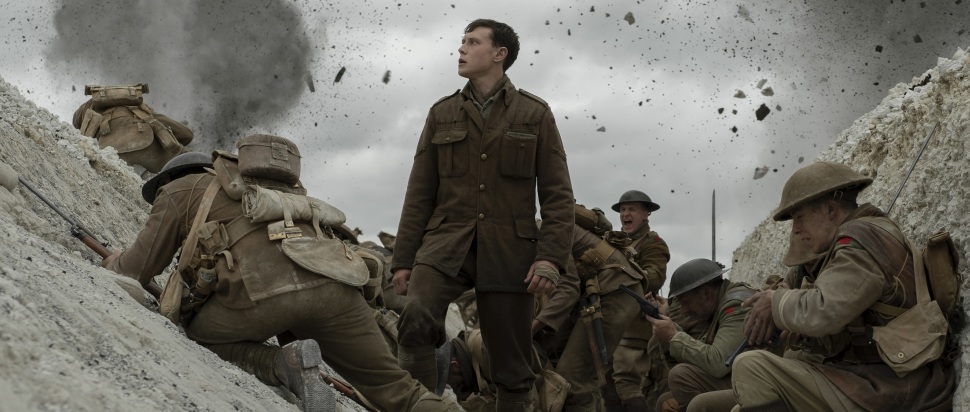1917
Over a series of long takes, director Sam Mendes shows himself to be a filmmaker in complete command of his craft, while George MacKay makes for a compelling surrogate for the generation of young men sacrificed in the First World War
Let’s get this out of the way first: 1917 isn’t a single-shot movie. A more accurate number would be two shots, or three if we’re stretching it. There’s a startling cut to black at the midway point of Sam Mendes’ war epic when a soldier is knocked unconscious. It’s the most distinguishable cut but, of course, there are more cleverly disguised edits peppered throughout to give the impression of a seamless take. Regardless, acknowledging that the film features double the number of shots than what’s being advertised doesn’t do anything to diminish the staggering achievement of what’s being told. 1917 is a triumphant piece of filmmaking, all bravado and ambition expertly realised at the hands of Mendes and his cinematographer, the always-superb Roger Deakins.
The First World War has inspired countless tales of heroism and sacrifice, each offering filmmakers the chance to showboat their technical prowess. Mendes bases his story on anecdotes told by his great-grandfather to craft an audacious thriller that moves through the battlefields of France. Two soldiers, Schofield (MacKay) and Blake (Chapman) are tasked with delivering a message across enemy lines to a battalion of troops who are unaware that they are heading into a deadly ambush the next morning. Among those in danger is Blake’s brother, amping the stakes for the race against time.
Their journey takes them through the claustrophobia of the trenches and the life-threatening terrain of the front lines and No Man’s Land. The camera glides along with their hurried steps, actor and equipment syncing together in perfect choreography. It’s a mind-boggling endeavour to wrap your head around, as every line, movement and gunshot seem perfectly timed for the lens to capture. Grounding the action is MacKay: his character is a blank slate for the generation of young men who sacrificed everything, but the fear and uncertainty that paints his face elevates Schofield above being simply an everyman.
Apart from its visual gimmick, 1917 is disappointingly lacking in anything that distinguishes it from its contemporaries. It’s propelled by time, much like Christopher Nolan’s Dunkirk and the gritty warfare recalls Saving Private Ryan. And for all its technical achievements, almost all of the emotional weight is dropped in favour of impressing the audience. The film is completely absorbing, but there’s the infinitesimal doubt that perhaps you’re so immersed because it’s too seamless. The confident filmmaking, as spectacular as it is, ultimately betrays the reckless brutality of combat.
Despite the spectacle on screen, Mendes does take time to contemplate the futility of a war that cost the lives of millions. So much of the film is about moving forward and the journey through its magnificent setpieces. Then, in the quieter moments – a slow transport job, a morning spent in the rubble – Schofield takes those ephemeral chances to reflect, to look back on the damage and destruction left in his wake.
It would be a disservice not to applaud the stunning accomplishment from Mendes. Only a filmmaker with complete command of his craft could pull off such a feat.
Released 10 Jan by EOne; certificate 15
